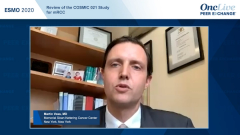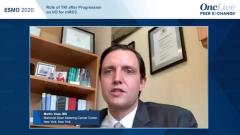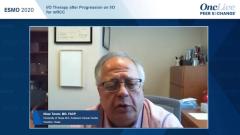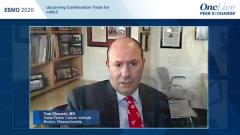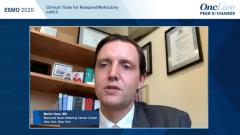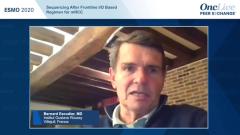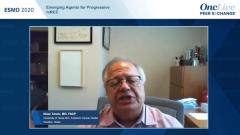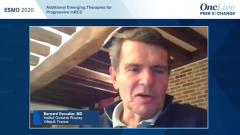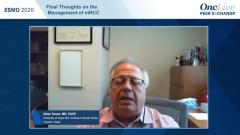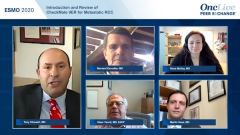
Additional Emerging Therapies for Progressive mRCC
Episodes in this series

Transcript:
Toni Choueiri, MD: Shifting gears to something dear to my heart, HIF2 inhibition. Dr McKay, you have been part of several trials. Are you excited about this targeting transcription factor? Where are we today? If you can review the data for us and the ongoing phase 3 study with HIF2 inhibitor.
Rana McKay, MD: This is a novel target and this was the ultimate reason for the Nobel Prize that was awarded to Dr Bill Kaelin and others for dissecting the importance of the HIF pathway in malignancies, and that work spawned the development of this agent. Toni, you eloquently presented these data last year, and it’s exciting to see in heavily pretreated patients who have received multiple lines of prior therapy. About 67% of patients had received a prior PD-L1 inhibitor or a VEGF inhibitor. Predominantly, patients who were intermediate and poor risk were seeing response rates on the order of around 24%, 25% with this agent that has a fairly tolerable adverse-effect profile. Quite different from TKIs [tyrosine kinase inhibitors]. We see anemia, and we see hypoxia that is reversible with discontinuation of the agent or dose modification. This is an exciting agent with a novel mechanism of action. Right now, it’s being tested against everolimus in a randomized phase 3 trial that’s currently accruing. We need new drugs with new mechanisms of actions. I’m excited to see this agent being developed.
Toni Choueiri, MD: I agree with you. Bernard, what is left? We’re hearing a bit about solid tumors, maybe the start of CAR [chimeric antigen receptor] T cell. Are you excited about other drugs, other targets, knowing we discussed I/O post-I/O, [immuno-oncology]. I would say extensively with CONTACT-03. Any new drugs and targets besides the glutaminase inhibitors that have 2 inhibitors. Perhaps you want to expand on CAR T. What else do you know that we don’t know?
Bernard Escudier, MD: One, I want to comment on something that Martin summarized in his presentation on the old material on nivolumab. That was the first time where we were able to improve survival. If you remember earlier, everybody was thinking, “We’ll never be able to improve survival in kidney cancer because we have so many lines of treatment.” Now, if we have elective treatment, we know we improve survival. We have seen it in second line, we have seen it first line, and we should have OS [overall survival] as a main goal for every new drug we have here. Having just PFS [progression free survival]—I don’t care about PFS, actually. That’s important. I don’t think CAR T cells are going to be important in kidney cancer. I might be wrong. I would be surprised. I’m old enough to remember when we did allogeneic transplantation in kidney that worked. I don’t think CAR T cells are going to work. It might be something we want to see more data on.
Toni Choueiri, MD: Bernard, there is a study Dr Tannir is involved with, by the name of PIVOT-09. It’s in the phase 3. It’s with pegylated interleukin 2. We’re not talking a lot about it because there have not been many studies with it. Nizar, what do you think about the combo? It’s in phase 3, pegylated IL-2 plus nivolumab—that’s the experimental arm. The control is either sunitinib or cabozantinib. What’s your take on that study, Nizar?
Nizar Tannir, MD, FACP: Obviously, PIVOT-09 is an ongoing phase 3 trial. It’s a global study. It’s accruing mostly in the United States, but there are some sites, including our own, that opened the study. We’ll have to wait and see.
Transcript Edited for Clarity


